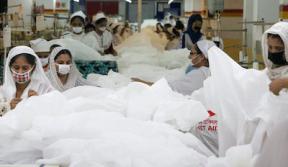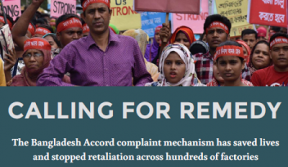Walmart and Gap, two corporations whose failure to protect worker safety has led to numerous worker deaths in Bangladesh, today announced a corporate-run factory auditing scheme, another in the long series of ineffective corporate auditing programs that these companies have touted for years. Walmart and Gap – joined by many, but not all, US brands and retailers – have refused to sign the binding Accord on Fire and Building Safety in Bangladesh, an enforceable worker safety program with more than seventy company signatories from more than fifteen countries. Walmart, Gap and the corporations that have chosen to join them, are unwilling to commit to a program under which they actually have to keep the promises they make to workers and accept financial responsibility for ensuring that their factories are made safe. Instead, they offer a program that mimics the Accord rhetorically, but that omits the features that make an agreement meaningful. We explain in detail below why this scheme falls far short of the program embodied in the binding, enforceable safety Accord.
1) This is a company-developed and company-controlled program“founded by a group of 17 North American apparel retailers and brands who have joined together to develop and launch the Bangladesh Worker Safety Initiative.” Worker representatives are not part of the agreement and have no role whatsoever in its governance. Given the grave risks facing millions of workers in Bangladesh, there can be no credible or effective program without a central leadership role for worker representatives, as in the Accord on Fire and Building Safety in Bangladesh.
2) Under the Gap/Walmart scheme, brands and retailers are not obligated to pay one cent toward the renovation and repair of their factories in Bangladesh. Companies are only obligated to pay administrative fees to cover a training program, overhead, etc. Beyond this, there are no financial obligations. The only assistance for renovations referenced in the “Alliance” documents is a purely voluntary loan program, “administered solely by the Member [i.e., the brand or retailer] who makes such funds available, on terms and conditions to be established solely by that Member.” The “Alliance” documents explicitly state that providing such funds is “not a condition of membership in the Alliance.” Walmart, Gap and their allies claim that unnamed companies will make $110 million in loans available, but this is a voluntary aspect of the program and there is no way of knowing whether any company will follow through. Under the Accord, brands and retailers are obligated to ensure that all necessary funds are available to cover the cost of renovations and repairs at every covered factory. This is not a voluntary pledge, but a binding, enforceable obligation. The priorities of Walmart, Gap and their allies are clear. Under the Accord, the bottom line is factory safety. Brands and retailers must pay what it takes to make all factories safe. Under the Gap/Walmart scheme, the bottom line is limiting the brands’ and retailers’ costs. The mandatory costs for brands and retailers are capped from the start and limited to a maximum of $1 million per year, with no mandatory commitment to pay for factory renovations and repairs. This means most workers will continue to work in dangerous factories.
3) Under Walmart/Gap scheme, the brands and retailers control the factory inspections. The only role of the “Alliance” is to propose standards and methods and accredit auditors. The brands and retailers choose the auditors, pay the auditors, and control the inspections. The supposed check on the company inspections will be a “spot check” system. Unfortunately, because the Walmart/Gap scheme involves no power sharing with worker representatives, but is instead an industry-controlled program, these “spot checks” will consist exclusively of corporations checking on the inspections of other corporations. If all of this sounds very similar to the failed “CSR” programs and auditing schemes that brands and retailers have been using in Bangladesh for more than a decade, that’s because it is. The Walmart/Gap scheme preserves the very model that has failed workers for years and led to nearly two thousand deaths.
4) This “Alliance” of apparel brands and retailers imposes few obligations on its members – and those it does impose are unenforceable. Under the terms of the “Alliance,” any company can walk away whenever it wants. The sole penalty for doing so is that the company has to pay part or all of its administrative fees, depending on how soon it chooses to quit. The total potential cost to the big players is a maximum of $5 million. Walmart has revenues in excess of $400 billion. For a company with billions of dollars in revenue, such a penalty is a minimal cost of doing business, not a serious deterrent. This confirms what labor rights advocates have long predicted: that Walmart, Gap and companies like them simply do not want to make any promises they actually have to keep. What they want is to be able to make promises now, at a time of major public and media scrutiny, that they can walk away from whenever it suits them, at a token cost. Under, the Accord, worker representatives have the power to initiate enforcement proceedings against companies that fail to comply with their obligations. In contrast, as we heard from Walmart at today’s press conference, the only recourse workers have under the “Alliance” is to call a “hotline” or otherwise communicate their concerns to the brands and retailers who retain sole power and discretion.
5) Under the Accord, the right of workers to refuse dangerous work, including the right to refuse to enter a dangerous building, is protected. In the wake of Rana Plaza, the vital importance of protecting this right should be obvious to every company doing business in Bangladesh. Yet the Walmart/Gap scheme makes no mention of the right of workers to refuse dangerous work, leaving factory managers free to bully workers into dangerous buildings, like their counterparts did at Rana Plaza.
In addition to the fundamental flaws outlined above, which render the Walmart/Gap scheme ineffective, it is important to bear in mind the track records of these companies: the workers who have died in their contract factories and the unfulfilled promises they have made. Walmart has been in Bangladesh for nearly a quarter of a century, and has insisted year after year that it was working assiduously to protect the rights and safety of workers. Yet the company never carried out a single dedicated fire or building safety inspection prior to this year. Gap announced, nearly a year ago, a supposedly robust and comprehensive program to inspect and renovate all of its factories in Bangladesh. As of today, Gap has not cited a single example of a factory that has been renovated. Gap and Walmart have no credibility left on this issue.
The DC-based labor rights watchdogs also note that Walmart/Gap have made a cynical attempt at providing third-party cover for their scheme by enlisting the Bipartisan Policy Center (BPC) as a sponsor. In a recent message to the Organization for Economic Cooperation and Development (OECD), former Senator George Mitchell and Senator Olympia Snowe, wrote on behalf of the BPC,
Under the auspices of the Bipartisan Policy Center, we are independently facilitating a robust and principled dialogue among leading garment retailers and brands as they work to achieve consensus on a single, unified safety plan designed to improve worker conditions in Bangladesh garment factories.
The Senators failed to disclose the significant financial ties the BPC has to the companies they are assisting. According to a report on The Nation magazine’s website:
In its most recently published annual report, the Bipartisan Policy Center notes that the law firm Alston & Bird, one of Wal-Mart's many registered lobbying firms, is among the organization's corporate donors. Earlier this year, former Senator Blanche Lincoln (D-AR) registered as one of Wal-Mart's representatives through the firm. Alston & Bird also represents the National Retail Federation, a trade group that counts many of the nation’s leading retailers as members.
Others affiliated with the Bipartisan Policy Center work for the retailers involved in the rival accord. The Bipartisan Policy Center’s “Democracy Project” advisors include former Senator Don Nickles (R-OK), who is now a lobbyist for Wal-Mart, as well as Don Fierce, founder of Fierce, Isakowitz & Blalock, a firm that helps the Retail Industry Leaders Association influence Congress. The RILA, yet another trade group supporting the alternative labor agreement, is led by a board that includes the CEOs of J.C. Penney and Wal-Mart.

